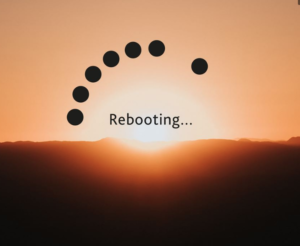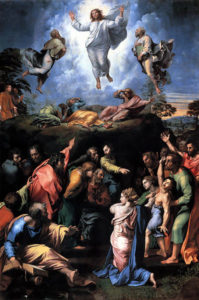The Readings
Genesis 17.1-7, 15-16
When Abram was ninety-nine years old, the Lord appeared to Abram, and said to him, ‘I am God Almighty; walk before me, and be blameless. And I will make my covenant between me and you, and will make you exceedingly numerous.’ Then Abram fell on his face; and God said to him, ‘As for me, this is my covenant with you: You shall be the ancestor of a multitude of nations. No longer shall your name be Abram, but your name shall be Abraham; for I have made you the ancestor of a multitude of nations. I will make you exceedingly fruitful; and I will make nations of you, and kings shall come from you. I will establish my covenant between me and you, and your offspring after you throughout their generations, for an everlasting covenant, to be God to you and to your offspring after you.
God said to Abraham, ‘As for Sarai your wife, you shall not call her Sarai, but Sarah shall be her name. I will bless her, and moreover I will give you a son by her. I will bless her, and she shall give rise to nations; kings of peoples shall come from her.’
Mark 8:31-38
Then Jesus began to teach them that the Son of Man must undergo great suffering, and be rejected by the elders, the chief priests, and the scribes, and be killed, and after three days rise again. He said all this quite openly. And Peter took him aside and began to rebuke him. But turning and looking at his disciples, he rebuked Peter and said, ‘Get behind me, Satan! For you are setting your mind not on divine things but on human things.’
He called the crowd with his disciples, and said to them, ‘If any want to become my followers, let them deny themselves and take up their cross and follow me. For those who want to save their life will lose it, and those who lose their life for my sake, and for the sake of the gospel, will save it. For what will it profit them to gain the whole world and forfeit their life? Indeed, what can they give in return for their life? Those who are ashamed of me and of my words in this adulterous and sinful generation, of them the Son of Man will also be ashamed when he comes in the glory of his Father with the holy angels.’
Scripture Quotations are from the New Revised Standard Version Bible: Anglicized Edition, copyright © 1989, 1995 National Council of the Churches of Christ in the United States of America. Used by permission. All rights reserved worldwide. http://nrsvbibles.org
The Sermon
By Catherine, a Reader at St. Mary's
When I was in my 20s I attended a conference. It explored issues such as peace, justice, fair-trade and the environment. At a workshop on Speaking Out they suggested that you don’t have to be an expert on something in order to talk about it. We were each given a card and told not to look at it. Then in turn we were to stand up, look at our card and talk about what was on it. All went well. Then it was my turn. I stood up, looked at my card, proclaimed the word “Gaia”...and stopped. I knew “Gaia” only as the name of a fictional organisation in the 1980s television series “Edge of Darkness”. There was a disclaimer at the end saying that this “Gaia” was completely unrelated to the Gaia movement. If I’d talked about the fictional Gaia of the television series, people would have been misinformed about the real-life movement. It turns out you did actually need to know something about a subject before speaking out on it!
If you can’t see it clearly yourself, it’s probably best not to tell others about it just yet. Let’s bear this thought in mind when exploring this week’s Gospel reading. In order to set the scene it helps if we start reading from Mark 8.22.
Jesus and his disciples, plus a crowd of taggers-on, have been travelling through the villages and towns of Galilee. In Bethsaida, a blind man has been brought to Jesus for healing. Jesus leads him away from the village, away from onlookers, and begins to heal him. At first, the man sees only partially – he sees people, but they look like walking trees. Jesus lays his hands on him again, and his sight is fully restored – he now sees clearly. Jesus tells him to go directly home without passing through the village. Keep this to yourself for now!
Jesus and his followers continue on their way. Whilst they are walking, Jesus asks his disciples who people say he is. They reply: “John the Baptist, or Elijah, or one of the prophets”. He then asks them who they think he is. Peter immediately declares that Jesus is the Messiah. Jesus orders the disciples not to say anything to anyone about this. Keep this to yourselves for now!
In today’s passage, Jesus starts to teach the disciples what being the Messiah means. It means suffering, rejection by the religious authorities and death, then rising again after 3 days. We’re told that Jesus says this quite openly – everyone can hear about what it means to be the Messiah in general terms.
Peter won’t have this. He takes Jesus to one side, and has a quiet word in private. “Jesus, this won’t do – this isn’t what people signed up for.” We can assume Jesus chooses not to keep the conversation private, for he turns to all the disciples and rebukes Peter: “Get behind me, Satan! You’re thinking of human things not divine things!” Everyone can hear this too.
Then, turning to the crowds, Jesus stresses what it means to follow where he is going. It means letting go of their own personal needs and wants, and of what society wants from them. It means suffering and possibly death. They need to understand this.
Openness. Secrecy. The blind man is brought to Jesus in the open. He is healed in private. You can talk openly about what it means to be the Messiah, but must keep secret, for now, the idea that Jesus is the Messiah. Peter rebukes Jesus in private. Jesus rebukes Peter openly.
Not seeing. Partially seeing. Clarity of sight. The man can’t see. Then he can see, but imperfectly. Finally he sees with great clarity.
Who is Jesus? Some don’t see at all. Some get a rough idea – John the Baptist, perhaps, or Elijah, or a prophet? Peter sees clearly. Jesus is the Messiah!
Peter thinks he sees clearly. But then it turns out he isn’t seeing clearly at all, because he doesn’t understand what it means to be the Messiah. This rejection, suffering and death, and rising again business just doesn’t fit Peter’s picture of the Messiah. So perhaps it’s just as well Jesus has cautioned his disciples to keep this quiet for now.
Who is Jesus? As he travels from village to village, from town to town, many are following him, curious, hopeful, expectant. What do they see? What do they think they see? Do they see where all this is leading? If they want to be a part of what Jesus is doing, do they fully see what this will mean?
What does it mean to be a true follower of Jesus? It doesn’t mean watching a series of miraculous healings, although healings are certainly taking place. It doesn’t mean listening to an intriguingly good storyteller, though that’s happening too. It means means taking up the mantle of suffering and death just as Jesus is soon to do. It means challenging those in power, with all the risks that that involves.
Jesus is quite open about this. He wants his disciples and the crowds to understand exactly what they are signing up for if they want to follow him. They must do this with clarity of sight. They mustn’t encourage others to follow him too if they themselves don’t see clearly what it may mean.
Following Jesus means suffering, possibly even death. If those wishing to follow him cling on to personal, human and societal needs and wants, they will not experience the fullness of life that God freely offers. But, paradoxically, if those followers sit light to their personal human needs and wants and embrace the possibility of suffering, they will find that God-given life in abundance. See that fully, and one can speak out in confidence.
The Prayers
Prepared by Barbara
In the power of the Spirit and in union with Christ, let us pray to the Father.
O God, the creator and preserver of all, we pray for people in every kind of need; make your ways known on earth, your saving health among all nations.
We pray for this wonderful world that you have given us. Please help us to be good stewards of your creation.
We pray that we can understand the lessons that you want us to learn from this pandemic, thinking particularly of how you want us to care for this wonderful world, so that we can stop destroying it.
We pray that all countries play their part in preventing further global warming. Please help those countries who have contributed most to the problem to recognise our responsibility to help those countries most heavily affected, who haven’t usually contributed much to the problems but suffer most.
Lord, in your mercy
hear our prayer.
We pray for all of those affected by the Covid-19 epidemic.
We pray for the worldwide success of vaccination campaigns, and that vaccines are made available to all countries, regardless of their wealth or lack thereof. We pray that we can play our part in this!
We pray for all those who have lost someone they love and ask that you comfort them in their grief.
We pray for those who are struggling with their own illness: please bring them healing.
We pray for those suffering from loneliness and isolation: please help us to be your agents in bringing them contact and comfort.
Lord, in your mercy
hear our prayer.
We pray for those affected by any sort of relationship breakdown at this loneliest of times: couples who are no longer couples; housemates who can no longer bear each other’s company; young people who feel that they are not able to grow into independent adults; people who find themselves at risk of abuse. Please help us to notice when people need help and to bring them the help they need.
We pray for all our children: please help us to work out how to balance their education and need for face-to-face friendships with our need to keep those more vulnerable to the virus safe.
Lord, in your mercy
hear our prayer.
We pray for all countries facing unrest and changes of government. Please bring all our leaders the skills needed to lead us wisely, in peace and good will. We pray especially for the people of Myanmar, Yemen and Syria.
Lord, in your mercy
hear our prayer.
We pray for your Church throughout the world; guide and govern us by your good Spirit, that all who profess and call themselves Christians may be led into the way of truth, and hold the faith in unity of spirit, in the bond of peace and in righteousness of life.
We pray for all Christian communities in this country and around the world, as we strive to find new ways of being your family that do not put each other in danger during this pandemic. Please help us to reach those who most need your comfort and help.
We pray especially for our worshipping community of St. John’s Ranmoor, St. Mark’s Broomhill and St. Mary’s Walkley as we learn new ways of joining together in love for you. Please help us to feel your presence in a world turned upside down and to share that presence with others.
Lord, in your mercy
hear our prayer.
We commend to your fatherly goodness all those who are in any way afflicted or distressed, in mind, body or estate; comfort and relieve them in their need, give them patience in their sufferings, and bring good out of their troubles. In moments of peace and contemplation, we name to you all those known to us who are suffering. Please care for them and for all those of whose suffering we are unaware.
Lord, in your mercy
hear our prayer.
We remember those who have gone before us in the peace of Christ, and we give you praise for all your faithful ones, with whom we rejoice in the communion of saints. We pray especially for your servant Malcolm, who died 27 years ago but is still sadly missed by his family. Please comfort them. We name to you in our hearts all those known to us both near and far, asking that you bring your comfort and healing to their families and friends at this time of grief.
Merciful Father,
accept these prayers
for the sake of your Son,
our Saviour Jesus Christ.
Amen.
Common Worship: Services and Prayers for the Church of England, material from which is included here is copyright (c) The Archbishops' Council 2000




